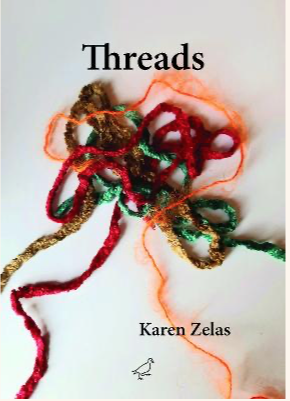Threads by Karen Zelas Reviewed by Hester Ullyart

Threads by Karen Zelas. Pūkeko Publications (2022). RRP: $25.00. Pb.130pp.
ISBN 9780473656867. Reviewed by Hester Ullyart.
Karen Zelas’ latest collection, Threads, is a love letter to family lines; past, present, future.
Opening poems fall under the hush of ‘I want to say…’; here Zelas uses her most supple tool to hand – the word – to cradle fearsome thoughts too precious for the tongue to utter. It is a scary time of hospital, surgery, and the memories of past loss it triggers; the shock of a healthy, resilient life suddenly faced with mortality, as the ‘Neck of swan’ (p.53) ballerina sister is diagnosed with breast cancer, hurdling resolutely the inevitable treatments that follow, under the watchful gaze of elder:
‘axillary nodes a jack hammer throbs you admire the flowers:
yellow lillies sapphire irises that echo your blue tinged skin’ (p.11)
Where one generation falters, another busts into form – a fact inescapably notable by the presence of a grandson growing into a man,
‘he has grown like a runner
bean – slouches buds
in ears from chair’ (p.9)
images springing a life revolving whanau, grateful for the clattering domesticity that snaps the worrier out of mute fears.
Letters filled with a love of language form the basis of the poems within ‘Locked down’. Firmly planted in autumnal years,
‘Do you remember spring? Flares, hot pants, Mary Quant. Your long yellow boots behind the Iron Curtain.’ (p.32)
living the geographical consequence of different paths taken, day journals ferry their way between Aotearoa and England. Covid clamps during an Antipodean visit, and the yearned for is suddenly nose close.
We are invited to sip that bittersweet spoon of personal comparison that only the closest bonds can cook up, but tricky moments ease as the bubbles learn how to be. Zelas gives words to the hard to define ghosts that family reunions bring:
‘She hasn’t come alone, there is a presence about her. So like our mother. (…) I’d say two sisters can never be together without their mother in the picture, somewhere, disguised in a Rorschach?’ (p.39)
Making up the main of the second half, is ‘Geography of Loss’. With emphasis on the importance of locating those irreparably perished, physically and mentally, Zelas fleshes out their human story via evident detailed research of the family tree:
‘seeing makes it real
as words from aging lips
have not you see what they lost
when till now you’ve seen only
the gains’ (p.118)
Here we enter the lives of beloved ancestors struck by the darkest plight, that of being Jewish during the Holocaust, and prior to that, as immigrants baking beigel on the cobbles of Brick Lane, in the East end of London. Dramatic device of chorus, dialogue, call and answer work well, weaving a spell of sensory life and character in mournful witness:
‘lost
to two generations
I find her Devorah/Dora my grandmother
a small act the finding
how could they have lost her?’ (p104)
In Threads, Zelas examines the through-lines that bind and propel, carefully tending to the present, darning the pain where we can – that ever looping, precious terrain of family.